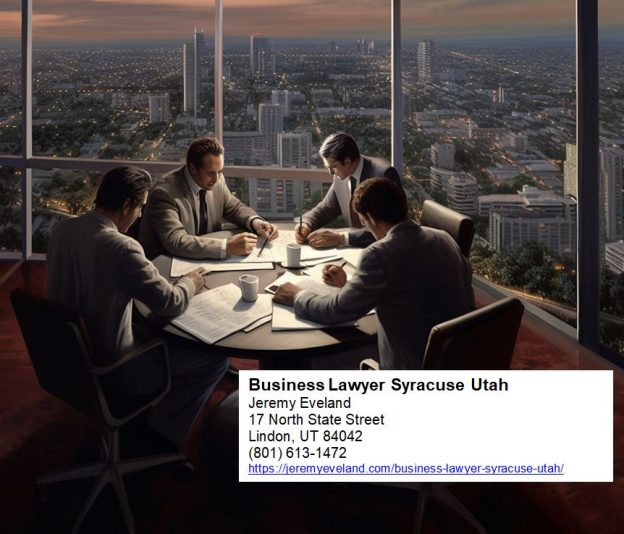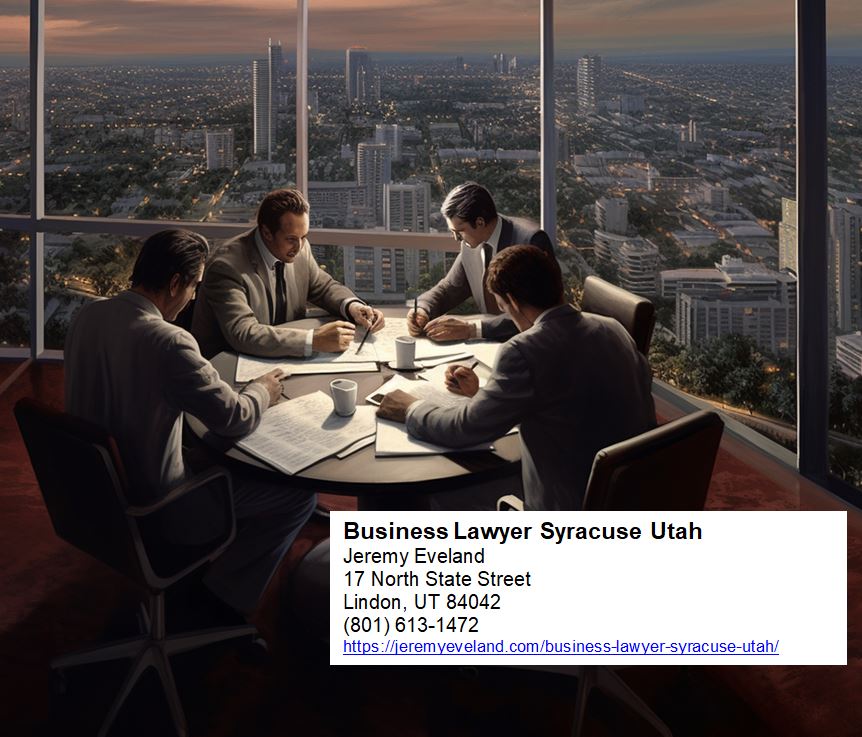Business Lawyer Highland Utah
In the ever-changing landscape of business, it can feel like you are navigating through a dense forest, uncertain of what lies ahead. Just as a compass guides explorers through uncharted territory, a business lawyer in Highland, Utah serves as your guiding light in the legal realm. Like the towering peaks of the nearby mountains, they stand tall to protect your interests and ensure your success in this competitive market.
Picture this: you are embarking on a new venture in Highland, Utah – a place known for its entrepreneurial spirit and bustling economy. As you set foot on this path, you realize that there are countless laws and regulations that govern businesses in this region. It's easy to get lost in the maze of legal jargon and compliance requirements. But fear not! A skilled business lawyer is here to navigate these treacherous waters with you, ensuring that every step you take is within the bounds of the law.
But their role goes beyond just keeping you on the right side of legality. They are your shield against potential legal disputes and litigation that may arise along the way. With their expertise and experience, they will fight tirelessly to protect your interests and safeguard your hard-earned assets. From drafting ironclad contracts to resolving conflicts amicably, a business lawyer is an invaluable asset that ensures smooth sailing for your enterprise.
So, whether you're just starting out or have been running a successful business in Highland for years, don't underestimate the power of having a knowledgeable legal professional by your side. In this article about 'Business Lawyer Highland Utah,' we will delve into why understanding business laws and regulations is crucial for success in this region. We will explore how a business lawyer can safeguard your interests during legal disputes and help draft contracts tailored specifically to meet your needs. Additionally, we will shed light on intellectual property protection and trademark laws unique to Highland so that you can establish strong foundations for long-term growth and prosperity. Get ready to embark on a journey that will equip you with the knowledge and tools necessary to conquer the business landscape of Highland, Utah.
Key Takeaways
- Business lawyers in Highland, Utah provide guidance and support in navigating legal complexities and compliance requirements.
- They draft ironclad contracts and resolve conflicts amicably, ensuring legal protection and minimizing risks for businesses.
- Business lawyers specialize in intellectual property, helping identify and register intellectual property, drafting licensing agreements, and ensuring compliance with trademark laws.
- Hiring a knowledgeable business lawyer in Highland, Utah safeguards company assets and reputation, providing guidance on best practices for protecting intellectual property rights.
Understanding Business Laws and Regulations in Highland, Utah
So, you're a business owner or manager in Highland, Utah and you're looking to understand the ins and outs of business laws and regulations in your area? Running a successful business requires not only hard work and dedication but also a thorough understanding of the legal framework surrounding businesses. It's essential to abide by these laws to protect your company's interests and ensure its long-term success. This is where a business lawyer in Highland, Utah can be an invaluable asset.
Business laws and regulations encompass various aspects that govern how businesses operate in Highland, Utah. These laws cover areas such as contracts, employment practices, intellectual property rights, taxation, zoning regulations, and more. Understanding these laws is crucial as non-compliance can lead to costly consequences for your business. Hiring a knowledgeable business lawyer who specializes in Highland's specific legal landscape can help you navigate through these complexities with ease.
A skilled business lawyer will guide you through the legal requirements necessary for operating your business smoothly while minimizing any potential risks or liabilities. They will help ensure that all contracts are legally sound and enforceable while protecting your interests during negotiations with suppliers, partners, employees, or clients. Additionally, they will advise you on compliance with labor laws to avoid any disputes or penalties related to hiring practices or employee benefits.
Having a good grasp of the local business laws and regulations is essential for any entrepreneur in Highland, Utah. To navigate this complex legal landscape successfully and protect your interests effectively, it is highly recommended to seek the expertise of a professional business lawyer. They will provide valuable guidance on complying with the law while helping safeguard your company from potential legal issues along the way.
Now let's delve into the role of a business lawyer in protecting your interests without writing 'step'.
The Role of a Business Lawyer in Protecting Your Interests
As your legal advocate, a business lawyer can act as a shield, safeguarding your interests and fortifying the foundation of your enterprise. With their expertise in business law and extensive knowledge of legal issues that may arise, they can provide you with valuable legal advice to navigate through the complex world of entrepreneurship. Whether it's drafting contracts, negotiating deals, or handling regulatory compliance matters, a business lawyer is an essential asset to protect your interests and ensure that you are operating within the boundaries of the law.
One of the key roles of a business lawyer is to assist you in understanding and complying with the various laws and regulations that govern businesses in Highland, Utah. They will help you stay updated on any changes or new legislations that may impact your operations. By staying proactive and knowledgeable about these laws, you can avoid potential legal pitfalls and prevent costly mistakes. A business lawyer will work closely with you to analyze your specific circumstances and tailor their advice accordingly.
Another important aspect where a business lawyer plays a crucial role is in protecting your intellectual property rights. Intellectual property includes trademarks, copyrights, trade secrets, and patents that are unique to your business. Your lawyer will guide you through the process of registering these assets and ensuring they are properly protected from infringement or misuse by others. In case any disputes arise regarding intellectual property rights, they will represent your interests and take appropriate legal action.
In addition to providing sound legal advice on day-to-day operations, a business lawyer also serves as an invaluable resource when it comes to handling legal disputes and litigation. Whether it's resolving conflicts with employees or dealing with contract breaches by suppliers or clients, having a skilled attorney by your side can make all the difference in achieving favorable outcomes. They will explore alternative dispute resolution methods such as mediation or arbitration before resorting to litigation if necessary.
With a dedicated business lawyer on board who understands Highland's specific laws and regulations related to businesses, you can focus on running your enterprise with confidence, knowing that your legal interests are well-protected. Now that you understand the role of a business lawyer in protecting your interests, let's delve into the next section on navigating legal disputes and litigation without compromising the stability of your business.
Navigating Legal Disputes and Litigation
When facing legal disputes and litigation, it's crucial for business owners to have a clear roadmap to navigate through potential obstacles. Litigation can be a complex and time-consuming process, which is why having the expertise of business lawyers is essential. These professionals specialize in handling legal matters related to businesses and can help you understand the complexities of the legal system. With their knowledge and experience, they can guide you through the process, ensuring that your interests are protected.
Business lawyers play a vital role in resolving legal disputes for their clients. They have a deep understanding of local laws and regulations that apply to businesses in Highland Utah. This knowledge allows them to assess your situation accurately and provide you with sound advice on how to proceed. Whether you are dealing with contract disputes, intellectual property issues, or any other legal matter, business lawyers can offer valuable insights into the best course of action.
Navigating through litigation requires careful planning and strategizing, both of which business lawyers excel at. They will work closely with you to develop a strong case or defense based on your specific circumstances. Their expertise in gathering evidence, interviewing witnesses, and presenting arguments will greatly increase your chances of success in court. Additionally, small business lawyers understand the unique challenges that small businesses face when involved in litigation and will tailor their approach accordingly.
Hiring a business lawyer is crucial when facing legal disputes and litigation as they provide invaluable guidance throughout the process. With their expertise in local laws and regulations, they can help you understand your rights as a business owner while protecting your interests. By working closely with them, you can navigate through potential obstacles more effectively and increase your chances of reaching a favorable outcome in court.
Transition: Now that we've explored how business lawyers assist with navigating legal disputes and litigation, let's move on to discuss another important aspect: drafting contracts and agreements for your business…
Drafting Contracts and Agreements for Your Business
Now let's dive into how you can ensure the protection of your business by having well-drafted contracts and agreements in place. When it comes to running a business, having solid contracts and agreements is crucial. These legal documents set out the rights and obligations of all parties involved, ensuring that everyone understands their responsibilities and reducing the risk of disputes or misunderstandings. By working with a business lawyer in Highland Utah who specializes in drafting contracts, you can ensure that your agreements are thorough, enforceable, and tailored to meet the specific needs of your business.
A well-drafted contract should clearly outline each party's obligations, payment terms, delivery schedules, dispute resolution mechanisms, and any other important details relevant to your business. This ensures that both parties have a clear understanding of what is expected from them, reducing the chances of confusion or disagreements down the line. It also provides a legal framework for resolving any disputes that may arise during the course of your business dealings.
To illustrate this point further, let's take a look at a sample table that highlights some key elements commonly included in contracts:
| Contract Element | Importance |
|---|---|
| Scope of Work | High |
| Payment Terms | High |
| Delivery Schedule | Medium |
| Confidentiality Clause | High |
As you can see from this example table, certain elements like scope of work and payment terms carry high importance as they directly impact the success and profitability of your business. A skilled business lawyer can help you carefully draft these sections to protect your interests while ensuring fairness for all parties involved.
By having well-drafted contracts and agreements in place for your Utah-based business with the help of an experienced lawyer in Highland Utah focusing on drafting contracts specifically for businesses like yours will not only provide peace of mind but also act as a strong safeguard against potential legal issues. With solid contracts in place, you can confidently move forward with your operations, knowing that you have taken the necessary steps to protect your business. Speaking of protection, let's now transition into the next section where we will explore intellectual property protection and trademark laws in Highland, Utah.
Intellectual Property Protection and Trademark Laws in Highland, Utah
To protect your business like a suit of armor, it's essential to understand the importance of intellectual property protection and trademark laws in Highland, Utah. Hiring a business lawyer who specializes in these areas is crucial for safeguarding your company's valuable assets. An experienced lawyer can guide you through the complexities of intellectual property law and help you navigate the trademark registration process.
Intellectual property refers to creations of the mind, such as inventions, designs, logos, and artistic works. It is important to protect these intangible assets from unauthorized use or infringement by others. A skilled lawyer can assist you in identifying and registering your intellectual property to establish legal ownership rights. They will also help you draft licensing agreements that allow you to profit from your creations while maintaining control over their use.
Trademark laws play a vital role in protecting your brand identity and reputation. A business lawyer well-versed in trademark laws can assist with conducting thorough searches to ensure that your chosen name or logo does not infringe on existing trademarks. They will guide you through the application process, ensuring compliance with all necessary regulations and deadlines.
By hiring a knowledgeable business lawyer who specializes in intellectual property and trademark laws in Highland, Utah, you are taking proactive steps to safeguard your company's assets and reputation. With their expertise, they will help you navigate complex legal frameworks and provide guidance on best practices for protecting your intellectual property rights. Don't leave this critical aspect of your business vulnerable; consult with a trusted lawyer today to ensure proper protection for all aspects of your company's valuable assets.
Frequently Asked Questions
What is the cost of hiring a business lawyer in Highland, Utah?
The cost of hiring a business lawyer in Highland, Utah can vary depending on several factors such as the complexity of your legal needs and the attorney's experience. It is best to schedule a consultation to discuss specific pricing details.
How long does it typically take to resolve a legal dispute or litigation with the help of a business lawyer?
With the help of a business lawyer, resolving a legal dispute or litigation typically takes several months to a year. The duration depends on factors such as complexity, court availability, and the willingness of parties to negotiate.
What types of contracts and agreements can a business lawyer help draft for my business?
A business lawyer can help draft various types of contracts and agreements for your business, such as employment contracts, partnership agreements, non-disclosure agreements, and client/service agreements. They ensure legal protection and clarity in your business transactions.
Can a business lawyer assist with business formation and registration in Highland, Utah?
Yes, a business lawyer can assist with business formation and registration in Highland, Utah. They have the expertise to guide you through the process, ensuring compliance with local laws and regulations.
How can a business lawyer help protect my intellectual property rights and navigate trademark laws in Highland, Utah?
A business lawyer in Highland, Utah can help protect your intellectual property rights and navigate trademark laws. They have the knowledge and expertise to guide you through the legal process and ensure your rights are safeguarded.
Areas We Serve
We serve individuals and businesses in the following locations:
Salt Lake City Utah
West Valley City Utah
Provo Utah
West Jordan Utah
Orem Utah
Sandy Utah
Ogden Utah
St. George Utah
Layton Utah
South Jordan Utah
Lehi Utah
Millcreek Utah
Taylorsville Utah
Logan Utah
Murray Utah
Draper Utah
Bountiful Utah
Riverton Utah
Herriman Utah
Spanish Fork Utah
Roy Utah
Pleasant Grove Utah
Kearns Utah
Tooele Utah
Cottonwood Heights Utah
Midvale Utah
Springville Utah
Eagle Mountain Utah
Cedar City Utah
Kaysville Utah
Clearfield Utah
Holladay Utah
American Fork Utah
Syracuse Utah
Saratoga Springs Utah
Magna Utah
Washington Utah
South Salt Lake Utah
Farmington Utah
Clinton Utah
North Salt Lake Utah
Payson Utah
North Ogden Utah
Brigham City Utah
Highland Utah
Centerville Utah
Hurricane Utah
South Ogden Utah
Heber Utah
West Haven Utah
Bluffdale Utah
Santaquin Utah
Smithfield Utah
Woods Cross Utah
Grantsville Utah
Lindon Utah
North Logan Utah
West Point Utah
Vernal Utah
Alpine Utah
Cedar Hills Utah
Pleasant View Utah
Mapleton Utah
Stansbury Par Utah
Washington Terrace Utah
Riverdale Utah
Hooper Utah
Tremonton Utah
Ivins Utah
Park City Utah
Price Utah
Hyrum Utah
Summit Park Utah
Salem Utah
Richfield Utah
Santa Clara Utah
Providence Utah
South Weber Utah
Vineyard Utah
Ephraim Utah
Roosevelt Utah
Farr West Utah
Plain City Utah
Nibley Utah
Enoch Utah
Harrisville Utah
Snyderville Utah
Fruit Heights Utah
Nephi Utah
White City Utah
West Bountiful Utah
Sunset Utah
Moab Utah
Midway Utah
Perry Utah
Kanab Utah
Hyde Park Utah
Silver Summit Utah
La Verkin Utah
Morgan Utah
Highland Business Lawyer Consultation
When you need help from a Business Attorney near Highland UT, call Jeremy D. Eveland, MBA, JD (801) 613-1472 for a consultation.
Jeremy Eveland
17 North State Street
Lindon UT 84042
(801) 613-1472
Related Posts
Understanding LLC Laws in Utah
Business Lawyer Kaysville Utah
Understanding Utah’s Non-Profit Laws
Business Lawyer Clearfield Utah
Business Lawyer American Fork Utah
How To Handle Customer Complaints In Utah
Business Lawyer Saratoga Springs Utah
The Role of Business Law in Protecting Minority Shareholder Rights
What Are The 4 Different Types of Business Law?
Business Lawyer Washington Utah
Business Lawyer South Salt Lake Utah
Legal Requirements for Utah Technology Startups
Business Lawyer Farmington Utah
Due Diligence For Buying A Utah Business
Understanding Utah’s Labor Laws
Business Lawyer North Salt Lake Utah
Product Liability Laws in Utah
Preventing Cybersecurity Breaches
Business Lawyer North Ogden Utah
















